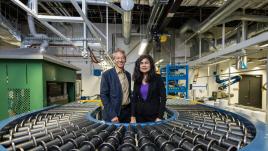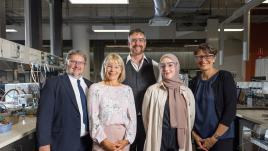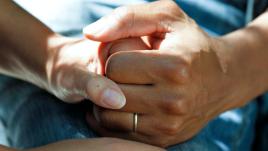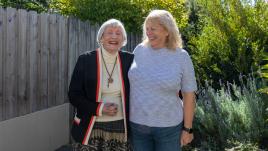FROM SOUTH-WEST SYDNEY, WITH LOVE
Ophthalmologist Dr Leanne Cheung is a South West Sydney success story. Now she and her husband, Conrad Yiu, have established a scholarship to help ease the way for more promising young students from the city’s outer suburbs to pursue their ambitions at UNSW.
Dr Leanne Cheung, ophthalmologist and eye surgeon, almost didn’t start her medical degree. Leanne‘s family ran a restaurant in what was then the tiny town of Appin, 16km south of Campbelltown. Money was tight, and Leanne had it in mind to secure a scholarship to help offset the cost of university. She had long cherished the idea of getting a medical degree, but when it turned out there were no scholarships on offer, she started looking for alternatives that did have scholarship programs. Besides, her mum, a nurse, had warned her off the idea of a career in medicine.
“Doctors work really, really hard,” Leanne remembers her saying. “I don’t think you should do it. There are easier things in life!”
Despite the protestations, it was her mum that had first inspired Leanne’s career ambitions. In the evenings, her mum worked alongside her dad in the restaurant, but by day she was a local community nurse.
“Appin was very small and there was no permanent GP. It was on a main road with coal trucks and there were a lot of accidents,” recalls Leanne. “Anytime there was a problem, people just came running to the restaurant to grab my mum – ‘Loretta! Loretta!’. Someone would have a bone sticking out through their skin in the middle of the road, and Mum would go look after them. I guess I just saw what a difference that makes to a community.”
As the deadline for university admission neared, Leanne suddenly had a change of heart.
“At the very 11th hour, I rang my dad. I was like, ‘I think I want to do medicine. I've always wanted to do medicine. It's going to cost a lot of money, but I think that's what I want to do.' And Mum and Dad were great. They just said, ‘Look, we want you to be happy. We'll find a way’.”
In the years since completing her degree in 1998, Leanne has forged a successful career in ophthalmology. She now has a private practice in Hurstville, and helps train the next generation of ophthalmologists at the Prince of Wales Hospital. In the early part of her career, she also spent time supporting the work of The Fred Hollows Foundation in Nepal, The Outback Eye Service in Bourke and The Myanmar Eye Care Project.
Leanne’s husband, Conrad Yiu, also a UNSW alumnus, is enormously proud of his wife’s story. He likes to make sure their teenage son is aware of her achievements, and of the barriers she had to overcome simply to have access to a quality education.
When the couple were considering the possibility of funding a scholarship at UNSW, it was Conrad who insisted that it should be designed to honour Leanne’s experience.
“I'm hoping that it helps someone like me, someone who thinks that Medicine might not be possible for them. We know that $10,000 a year is not that much money in the grand scheme of things, but to someone who has very little, it can make all the difference. It means that they do not have to take as many shifts so they can study a bit more and pay for things like the cost of transport to get to campus.”
The inaugural recipient of the newly mintedYiu-Cheung Medical Gateway Scholarshipis Linh, a young woman who arrived in Australia from rural Vietnam just six years ago, without any English, but with a dream of becoming a doctor. As a child in primary school, she had volunteered every day with her community’s local GP, Dr Tran.
“After working with Dr Tran for a while, and seeing all of his interactions with patients, it made me feel like I want to be in that role of helping people. I really want to become a GP. That was my inspiration, and it has kept me going.”
Arriving in Australia, Linh was a dedicated student throughout her high school years, ultimately earning the marks she needed to gain entry to the medical degree of her dreams. Anxious not to be a “burden” to her family, she was busy looking for a job to support herself while she studied when she heard the good news about the scholarship.
“I was on the train going home when I got the email. I screamed with joy. Everybody was looking at me! The first person I called was my sister. She was a very big emotional support throughout this.”
The scholarship will cover Linh’s rent and living expenses for the next six years, giving her every opportunity to focus on her study and achieve her dream.
“I want to be the best doctor I can, so I'm trying to get the highest marks, trying every single day to just keep myself going and get better and better, for the future.”
TheYiu-Cheung Medical Gateway Scholarshipis part of theUNSW Gateway Admission Pathway,a program that offers equitable access to UNSW for students from low-SES backgrounds and educationally disadvantaged schools, identified as Gateway partner schools. When the program was first introduced in 2020, the goal was to ensure that by 2025, 15% of students enrolling at UNSW would be students traditionally underrepresented in higher education.
In 2022, Professor Attila Brung, UNSW Vice-Chancellor, raised the target to 25%, in line with the Government’s commitment to fund an additional 20,000 Commonwealth Supported Places at Australian universities.
UNSW Chancellor, David Gonski AC, has been a passionate supporter of the program since its inception.
“While visiting schools across Australia, I have met many wonderful young people who I felt would mature into something absolutely phenomenal, if they were just given the chance. It’s just imbued within my heart that we owe it to them to elevate them so that they can, in turn, elevate all of us,” he has said.
“I am deeply committed to meet this challenge, and have dedicated considerable strategic funds as well as my own personal philanthropic support.”
It's a sentiment shared by Leanne and Conrad. “The Gateway program really spoke to us because we’re trying to find someone who has the capability, but might not realise they have that choice.
We’re really hoping to make it possible for someone to do medicine when they otherwise might not have done it. And we’re hoping that person then becomes the sort of doctor that represents a different part of the community, that hasn’t been well represented in medicine before.”








